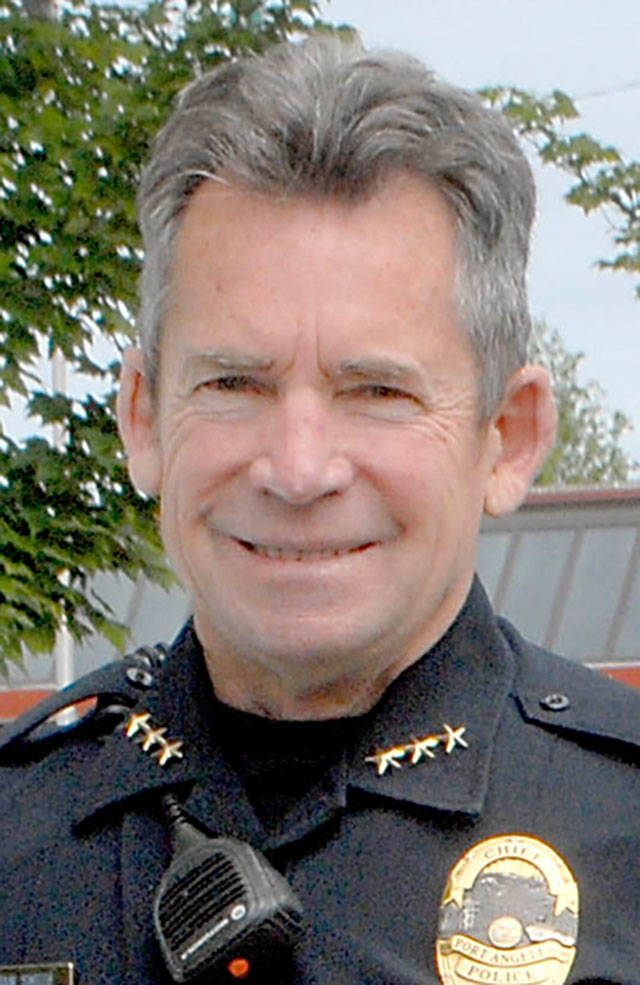PORT ANGELES — Reform legislation that went into effect this week has left law enforcement uncertain over how to protect the public, Police Chief Brian Smith and Deputy Police Chief Jason Viada said Tuesday.
Smith and Viada outlined their concerns about enactment of House Bill 1310 on permissible use of force by peace officers and House Bill 1054 on requirements for tactics and equipment used by peace officers at a Port Angeles Business Association breakfast meeting.
“July 25th, a lot of it took effect, and we don’t have clarification that you would get with case law,” Smith said.
“You have a case go to, say, civil court or criminal court, and [then] the words are interpreted. We’ve got a lot of new terms in these laws, and we’ve got some subjective requirements along with some objective ones.”
Their presentation was part of a push to shed a critical light on the legislation by North Olympic Peninsula law enforcement agencies. The effort continues at 8 a.m. today with Clallam County Sheriff Bill Benedict’s virtual program on the county Economic Development Council’s weekly Coffee with Colleen meeting at clallam.org.
“The city of Sequim, the county and us are all coordinating our message,” Smith said.
HB 1054, co-sponsored by 24th District state Rep. Steve Tharinger of Port Townsend, mandates that any use of force must be reasonable under the circumstances at the time, according to the bill synopsis at leg.wa.gov.
Tharinger did not return a call for comment Tuesday on the legislation.
Vehicle pursuits are allowed only if the officer has probable cause to believe the person has committed a violent offense, sex offense or an escape offense; if the officer suspects the person has or is driving under the influence; and if the person poses an “imminent threat” to public safety.
Pursuit must be preceded by permission from a supervisor and must be engaged in with supervisory control.
“Vehicle pursuits are severely restricted,” Smith said. “They were already for us. [Now] they’re even more restrictive.”
Neck restraints and choke holds are banned, military equipment such as armed vehicles and .50-caliber ammunition cannot be acquired, and no-knock warrants are not allowed.
The Criminal Justice Training Commission must convene a work group to develop a model policy for the training and use of canine teams that must include the consideration of a training curriculum that includes the history of race and policing.
House Bill 1310 says officers must apply “reasonable care” when determining whether to use physical force, consider the “totality of circumstances” and “exhaust available and appropriate de-escalation tactics prior to using any physical force.”
They must use “the least amount of physical force necessary to overcome resistance under the circumstances.”
De-escalation tactics they must consider include “leaving the area if there is no threat of imminent harm and no crime has been committed, is being committed, or is about to be committed.”
By July 1, 2022, state Attorney General Bob Ferguson must develop model policies on use-of-force and de-escalation tactics. Five months later, by Dec. 1, 2022, law enforcement agencies must submit their policies for Ferguson’s review.
“We now have a much larger state oversight of us, independent investigation, accountability, decertification and potential for officers for criminal prosecution,” Smith said.
“I was concerned about the volume of the legislation, the detail, and how much was going through, and I’m still concerned about that.”
Viada said the use-of-force standards were limiting, citing mental health crises in which people can be taken into custody under the Involuntary Treatment Act (ITA) but in which police involvement is now limited.
The police department no longer transports people taken into custody under the ITA unless a crime is being committed or there is an imminent danger or threat, Smith said later Tuesday.
“We are obligated to avoid being in a situation where we are not allowed to use force,” he said.
House Public Safety Committee Chair Roger Goodman of Kirkland and HB 1310 sponsor Jesse Johnson of Federal Way addressed the new use-of-force standards and the law’s impact on the ITA Friday in a joint statement.
“HB 1310 did not amend the Involuntary Treatment Act, and it was certainly not our intent to impair law enforcement’s ability to respond to behavioral health calls,” they said in the statement.
“On the contrary, the intention of HB 1310 and the other legislation passed this session was to give police the tools, training, and support to intervene in ways that decrease the likelihood of escalation and that prioritize treatment whenever possible. Nothing in the new law prevents officers from responding to calls for service and we believe it is law enforcement’s duty to respond.”
The law was driven by the March 2020 killing of Manuel Ellis, a Black man, while in the custody of Tacoma police, and the August 2010 shooting death of Native American woodcarver John T. Williams by a Seattle police officer.
“Before HB 1310, officers were authorized to use any amount of force necessary to effect an arrest and there were different use-of-force standards across the state,” the legislators said.
“To establish a consistent, statewide standard, we worked closely with community members and our partners in law enforcement to codify into law the preservation and protection of human life as the highest priority.”
A tiny percentage of calls that Port Angeles police go on present officers with a violent situation, Viada said, adding that does not make the new laws any less impactful.
“Those are critical incidents, and the decisions the officers are going to make are critical,” he said later. “They are going to be operating in a tense, rapidly evolving situation.”
________
Senior Staff Writer Paul Gottlieb can be reached at 360-452-2345, ext. 55650, or at pgottlieb@peninsuladailynews.com.

